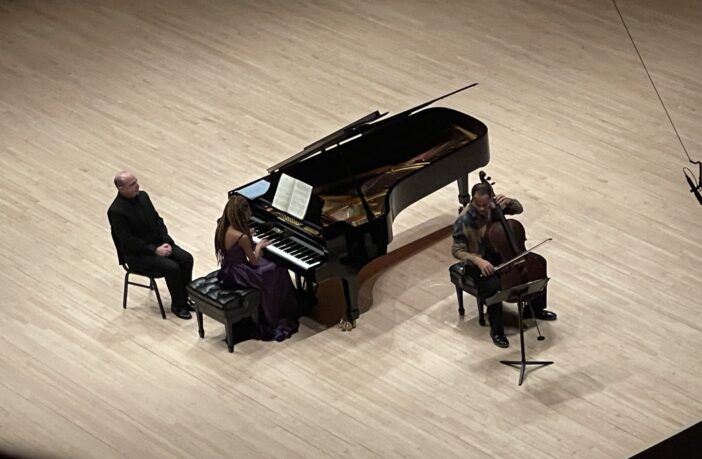A few days before British cellist Sheku Kanneh-Mason and his sister, pianist Isata Kanneh-Mason, were scheduled to perform at Carnegie Hall, he had a dispute with Air Canada about a seat they had booked for his cello (worth approximately $3.15 million, according to CNN). After the airline refused to allow them to board the plane with the instrument, they cancelled their concert date in Toronto. On Sunday afternoon at Carnegie Hall, that same instrument in Sheku’s hands resonated with authority as he navigated the compositions of Felix Mendelssohn, Gabriel Fauré, Natalie Klouda, and Francis Poulenc.
Isata established the joyful poignance of Mendelssohn’s “Cello Sonata No.1 in B-flat Major Op. 45” with her opening chords and sweeping octaves. Sheku swooped in and accentuated the swelling force of the string of notes. Isata concluded the segment with rapid arpeggios — a veritable filigree of folk songs. By the third movement, the brother and sister, just two of seven musically gifted siblings, were harmonically linked and took turns invoking the melody.
They soared together again on Fauré’s “Cello Sonata No. 1 in D Minor, p. 109.” Much of the solo space, understandably, belonged to Sheku, his fingers fluttering like hummingbird wings with each vibrant stroke of his bow, and the beauty of his cello bringing dramatic moments of French impressionist compositions. There was even a dip or two into the sonic waves of Erik Satie’s “Gymnopedies.”
Isata complemented his smooth articulation with rolling gallops up and down the keyboard. Their blend was almost conversational.
Sheku and Isata seemed practically gleeful in their interpretation of Klouda’s “Tor Mordon” (sea mount of light), a homage to them and their Antiguan and Welsh ancestry. Each movement combined folkloric images and their playing took on a storytelling evocation.
Sheku’s cello gave this premiere an unforgettable performance, with Isata teasing a collection of high notes as if to summon memories of their grandfather’s violin. At the close of their lovely treatment, Klouda joined them on stage.
The duo closed the concert with Poulenc’s “Cello Sonata, FP 143” providing grand opportunities to inspire each other with danceable lines of music, alternately bright and almost silent.
Whether in soft, featherily sprints on his instrument or the often thunderous leaps, Sheku was masterfully in control, and Isata, with each turn of the page, matched his brilliant delivery.
An extended standing ovation brought them back for an encore: “In the Bleak Midwinter,” a piece by Gustav Holst that was as short as it was fascinating.
They left the stage with Sheku holding his precious cello in a protective embrace.
Like this:
Like Loading…



